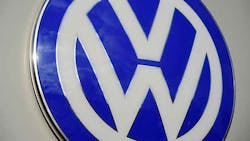Volkswagen has received four more weeks to reach an agreement with regulators for getting 600,000 diesel vehicles off U.S. roads, as it faces hundreds of lawsuits for rigging pollution control systems to cheat emissions tests.
U.S. District Judge Charles Breyer in San Francisco, who said at a hearing Thursday that “substantial progress” has been made, set an April 21 deadline for the carmaker to come up with a concrete and detailed proposal. Breyer also remarked that the company faces engineering difficulties in finding a solution.
Volkswagen admitted last year that it had rigged diesel engines on about 11 million cars worldwide so that emission controls switched on only during testing. Those controls shut off while the car was on the road, increasing fuel efficiency and performance but producing nitrogen oxide pollution well in excess of the U.S. legal standard.
“We’re working around the clock like everyone else,” Elizabeth Cabraser, the lead attorney for consumers suing VW, said after the hearing. “We’ll sleep when the cars are fixed.”
The automaker is facing lawsuits by the U.S. Justice Department and state attorneys general, and fines of as much as $46 billion, as well as hundreds of private lawsuits, for installing the so-called defeat device.
Breyer, who last month set March 24 as VW’s deadline, said that if there’s no plan by April 21 , he may set a trial for this summer. The judge said that he was being informed all along by the special master he appointed to the case, Robert Mueller, on the progress of the talks. Mueller, a former director of the Federal Bureau of Investigation, had been meeting with all the parties.
“Volkswagen is committed to resolving the U.S. regulatory investigation into the diesel emissions matter as quickly as possible and to implementing a solution for affected vehicles, as we work to earn back the trust of our customers and dealers and the public,” Jeannine Ginivan, a company spokeswoman, said in a statement.
Josh Van Eaton, a Department of Justice attorney, declined to comment after the hearing.
The broad framework of the agreement will include creating national and California funds to make amends for past and future environmental damage and solutions to reduce the pollution from the affected vehicles or remove them from the road, people familiar with the talks have said. The cost of buying back all the affected vehicles could total $9.4 billion, according to Bloomberg Intelligence analyst Brandon Barnes.
Financial Risk
Regulatory fines and lawsuits in the U.S. pose an even bigger financial risk. Volkswagen could face a worst-case scenario of $46 billion in penalties, according to Bloomberg Intelligence estimates. A settlement could help reduce that financial hit significantly.
Volkswagen and government regulators have expressed doubts as to whether the vehicles could be fixed at all. A California regulator this month told state lawmakers it was unclear a solution is possible. Lawyers for car owners proposed a July trial in a Monday court filing.
The judge is “obviously encouraged that there’s substantial progress, but he’s keeping Volkswagen’s feet to the fire,” said Adam Levitt, a member of the plaintiff lawyers’ steering committee. “If a fix is not in place by the April 21 hearing, the consequences for Volkswagen will not be favorable.”
In the U.S., beyond developing an effective repair for each of the three types of noncompliant four-cylinder engines, VW must document any adverse impacts on vehicles and consumers. VW will also have to fix about 85,000 Volkswagen, Audi and Porsche three-liter engines.
Because the emissions scandal centers on Volkswagen’s use of a sophisticated software to skirt regulations, any proposed remedy--whether retrofitting cars with new parts or revising software codes--will need to be tested by technicians from the U.S. Environmental Protection Agency and California before being accepted.
A settlement would free Volkswagen to focus more on overhauling its products and operations in the U.S. Plans include updating models every five years instead of seven, adding sport utility vehicles and buying more parts locally. And engineers at VW’s only U.S. factory, in Chattanooga, Tenn., will steer the new projects, reversing the failed pattern of planning cars for the North American market at the automaker’s headquarters in Wolfsburg, Germany.
About the Author
Bloomberg
Licensed content from Bloomberg, copyright 2016.
